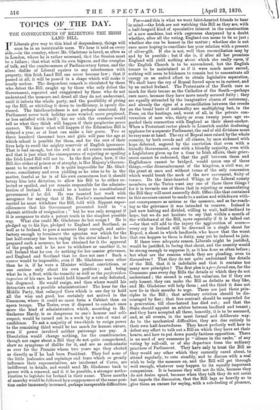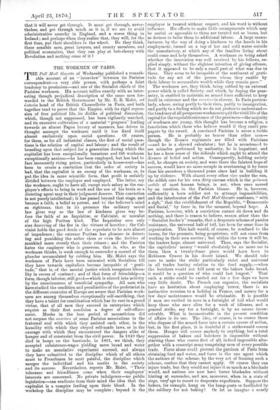TOPICS OF THE DAY
THE CONSEQUENCES OF REJECTING THE IRISH LAND BILL.
I F Liberals give way to this kind of despondency, things will soon be in an inextricable mess. We hear it said on every side,—in the country, where Mr. Gladstone is loved, as often as in London, where he is rather esteemed, that the Session must be a failure ; that what with its own bigness, and the overplus of talk, and the cumbrousness of Parliamentary forms, and the silent dislike of Liberal squires to any interference with property, this Irish Land Bill can never become law ; that if passed at all, it will be passed in a shape which will make it nearly useless. The despondent remark is circulated by those who detest the Bill, caught up by those who only detest the Government, repeated and exaggerated by those who do not understand the measure and dread all they do not understand, until it infects the whole party, and the possibility of giving up the Bill, or whittling it down to inefficiency, is openly dis- cussed. The faintheartedness is not perhaps unnatural, for Parliament never took holiday more wearied, more perplexed, or less satisfied with itself ; but we wish the croakers would tell us what they think will happen if their prophecies prove correct. We know what will happen if the Education Bill is delayed a year, or at least can make a fair guess. Two or three hundred thousand boys and girls will pass the age at which school is possible for them, and for the rest of their lives help to swell the mighty reservoir of English ignorance. That is bad enough, but the evil is at all events measurable, and that is just what the consequences of rejecting or spoiling the Irish Land Bill will not be. In the first place, how, if the Bill dies either of poison or of atrophy, is Her Majesty's Govern- ment to be carried on ? It is quite impossible for Mr. Glad- stone, conciliatory and even yielding as he tries to be in the matter, fearful as he is of his own earnestness lest it should betray him into dictation, to allow his Bill to be either re- jected or spoiled, and yet remain responsible for the adminis- tration of Ireland. He would be a traitor to constitutional government if he did. He was taunted last week with arrogance for saying that if Mr. Fowler's amendment were carried he must withdraw the Bill, told with flippant super- ciliousness that his Government presented itself in "a chronic attitude of resignation ; " but he was only arrogant if it is arrogance to state a patent truth in the simplest possible way. What else could Mr. Gladstone do but resign? He is pledged up to his lips, pledged to England and Scotland, as well as to Ireland, to pass a measure large enough and satis- factory enough to terminate the agrarian war which for the last half-century has been raging in the sister island ; he has prepared such a measure, he has obtained for it the approval of the people, and is he now to withdraw or smother it, to tell Ireland that he can do nothing for her master grievance, and England and Scotland that he does not care ? Such a course would be impossible, even if Mr. Gladstone were other than he is, if he were a Minister without convictions, or one anxious only about his own position ; and being what he is, a Scot, with the tenacity as well as the perfervidum ingenium of his race, he would hold himself not only defeated, but disgraced. He would resign, and then where would his detractors seek a possible administration? The hour for the Middle Party, that enlarged Cave which is one day to hold all the wise and good, has certainly not arrived in the Commons, where it could no more form a Cabinet than an opera troupe. The Tories, even if disposed to conduct once more the kind of administration which, according to Mr. Gathorne Hardy, is so dangerous to one's honour and self- respect, would be turned out in a week by a vote of want of confidence. To ask a majority of two-thirds to resign power to the remaining third would be too much for human nature, even if power involved neither patronage nor pay. A Dissolution would change nothing, for the constituencies, though not eager about a Bill they do not quite comprehend, show no symptoms of dislike for it, and are as enthusiastic as ever for the Premier whom two years ago they elected as directly as if he had been President. They feel none of the little jealousies and repinings and fears which so greatly influence their representatives, are intolerant of Caves, are indifferent to details, and would send Mr. Gladstone back to power with a renewed, and it it be possible, a stronger autho- rization to legislate for Ireland in their name. Three months of anarchy would be followed bya reappearance of the same posi- tion under immensely increased, perhaps insuperable difficulties. For—and this is what we want faint-hearted friends to bear in mind—the Irish are not watching this Bill as they are, with a half-languid kind of speculative interest in the construction of a new machine, but with eagerness sharpened by a doubt whether, after all the voting, England can mean to be so just ; whether she can be honest in the matter ; whether she is not once more hoping to conciliate her poor relation with a present of silver-gilt. If she is not, well then reconciliation may by and by be possible ; but if she is, if after all her promises England will yield nothing about which she really cares, if the English Church is to be surrendered, but the English tenure to be maintained as if it were much more sacred, nothing will seem to Irishmen to remain but to concentrate all energy on an united effort to obtain legislative separation. We shall have the cry of Repeal forced upon us in earnest, and by an united Ireland. The Protestants of the North care as much for their tenure as the Catholics of the South—perhaps care more, because they have more nearly secured fixity ; they are equally attracted by the imaginative charm of autonomy, and already the signs of a reconciliation between the creeds on the broad basis of nationality are multiplying fast, in the Press, on the hustings, and, worst of all, in the private con- versation of men who, thirty or even twenty years ago re- garded their connection with England as their sheet-anchor. When a Protestant rector pleads in Limerick amidst deafening applause for a separate Parliament, the end of old divisions must be very near at hand. The cry of Repeal once raised by the whole country, by both creeds and all classes, by men sickened with hope deferred, angered by the conviction that even with a friendly Government, even with a friendly majority, even with a Legislature given up for a time to Irish affairs, their griev- ances cannot be redressed, that the gulf between them and Englishmen cannot be bridged, would mean one of three things,—the dismemberment of the kingdom, a civil war, or the grant at once and without terms of the only concession which would break the neck of the new movement, fixity of tenure. Do the faint-hearted Whigs, or the Liberal county members, or the Tories want any one of these three things ?: for it is towards one of them that in rejecting or emasculating the Bill they will most assuredly drift. Offers like that contained in this measure cannot be made to a nation and withdrawn with- out consequences as serious as the measure, and as far-reach- ing as the grievance it was intended to remove. Ireland is just now halting and divided, willing to wait, half-inclined to hope, but we do not hesitate to say that within a month of the withdrawal of the Bill, more especially if it is talked out —for that will add to the injury the aggravation of scorn— every cry in Ireland will be drowned in a single shout for Repeal, a shout in which landlords, who know that the worst that can happen to them is fixity, may yet be induced to join. If there were adequate reason, Liberals might be justified, would be justified, in facing that shout, and the country would be strong enough to suppress it, as it has done so often before ; but what are the reasons which they are pleading, even to themselves ? That they do not quite understand the details of the Bill, that it is indefinite and that it contains too many new principles ? The first plea is apro formd one, for the Commons pass every day Bills the details of which they do not understand ; the second is real, but valueless, for if they are only honest, they can make the Bill as definite as they like, and Mr. Gladstone will help them ; and the third it does not now lie in their mouths to urge. There are just three prin- ciples in the Bill ; that arbitrary eviction should be dis- couraged by fine ; that free contract should be suspended for a generation, till class-hatred has died out ; and that the State should appoint an arbiter between landlord and tenant ; and they have accepted all three, honestly, it is to be assumed, and, at all events, in the most formal and deliberate way. As to the mechanical difficulties, they are due entirely to their own half-heartedness. They know perfectly well how to defeat any effort to talk out a Bill on which they have set their hearts, and how to put down purely factious opposition. There is no need of any summons to "silence in the ranks," of any voting by roll-call, or of any departure from the ordinary practices of Parliament. They have only to treat the Bill as they would any other which they earnestly cared about, to attend regularly, to vote steadily, and to discuss with a real wish to help the measure on, and the Bill will get through well enough, whatever may happen to its equally important companions. It is because they will not do this, because they do not desire speed, because when they talk they do not assist but impede the discussion, that the Bill lags so heavily as to give them an excuse for saying, with a sub-feeling of pleasure, that it will never get through. It must get through, never- theless, and get through much as it is, if we are to avoid administrative anarchy in England, and a worse thing in Ireland ; and perhaps when they realize that, they will, for the first time, put their shoulders to the wheel. Do they think, these sensible men, great lawyers, and county members, and political economists, that they can play at bob-cherry with Revolution and nothing come of it ?































 Previous page
Previous page